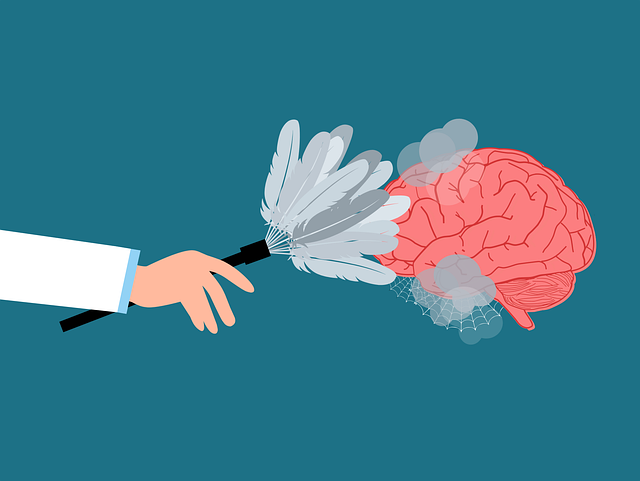Burnout among healthcare providers, a growing concern impacting patient care and health systems, is characterized by emotional exhaustion, cynicism, and detachment (Superior Functional Neurological Disorder – SFND). Recognizing its multifaceted signs and causes, including heavy workloads, insufficient support, and self-neglect, is essential. Public Awareness Campaigns can educate healthcare workers about burnout, emphasizing mindfulness meditation as a therapy for SFND. SFND therapy targets underlying neural patterns contributing to stress and exhaustion, enhancing resilience and improving coping mechanisms. Creating a supportive work environment with mental health awareness, self-care routines, and flexible policies is crucial. Integrating SFND therapy into care frameworks empowers healthcare professionals to manage stress and anxiety, fostering a culture of support and valuing their well-being. Holistic approaches like SFND therapy are essential for building resilience in high-pressure healthcare environments.
Healthcare provider burnout is a growing concern, impacting patient care and well-being. This article explores comprehensive strategies to prevent burnout among healthcare professionals. We delve into the root causes, including functional neurological disorder therapy as an innovative approach. By creating supportive work environments and encouraging self-care, we can enhance resilience. Discover how prioritizing mental and physical health, alongside implementing superior functional neurological disorder therapy techniques, can revolutionize healthcare provider wellness and performance.
- Understanding Burnout in Healthcare Providers: Recognizing the Signs and Causes
- The Role of Functional Neurological Disorder Therapy in Preventing Burnout
- Creating a Supportive Work Environment to Foster Resilience
- Self-Care Strategies for Healthcare Professionals: Prioritizing Mental and Physical Well-being
Understanding Burnout in Healthcare Providers: Recognizing the Signs and Causes

Burnout among healthcare providers is a growing concern, impacting not only individual well-being but also patient care and the overall health system. It’s essential to recognize that burnout isn’t just physical exhaustion; it’s a complex state resulting from prolonged exposure to stressful work environments. Healthcare professionals may experience emotional exhaustion, cynicism, and detachment from their work, leading to reduced professional efficacy. This condition, often referred to as Superior Functional Neurological Disorder (SFND), can have severe consequences if left unaddressed.
The signs of burnout are multifaceted. They include increased irritability, insomnia, changes in appetite, and a sense of detachment from patients and colleagues. The causes are equally diverse, ranging from heavy workloads, long working hours, and lack of control over work processes to insufficient support systems and poorly defined job roles. Public Awareness Campaigns Development can play a pivotal role in educating healthcare workers about burnout and promoting Self-Care Practices such as Mindfulness Meditation as effective coping mechanisms.
The Role of Functional Neurological Disorder Therapy in Preventing Burnout

In the context of burnout prevention strategies for healthcare providers, Superior Functional Neurological Disorder (SFND) Therapy emerges as a valuable tool. This therapy goes beyond traditional mental health treatments by addressing not just symptoms but also the underlying neural patterns that contribute to stress and exhaustion. By focusing on neuroplasticity – the brain’s ability to rewire itself – SFND helps professionals cultivate resilience, enhance coping mechanisms, and improve their overall well-being.
Incorporating SFND Therapy into a comprehensive burnout prevention plan involves regular sessions tailored to each individual’s needs. This can include techniques like biofeedback, mindfulness training, and social skills training, all aimed at reducing the risk of mental health professionals experiencing burnout. A holistic approach that considers both physical and emotional well-being is crucial, especially as studies highlight the significant correlation between unaddressed mental health issues and professional burnout.
Creating a Supportive Work Environment to Foster Resilience

Creating a supportive work environment is paramount in preventing burnout among healthcare providers, fostering resilience against the challenges they face daily. This involves cultivating a culture that prioritises mental health awareness and encourages self-care routine development for better mental health. By implementing policies that promote regular breaks, flexible schedules, and access to crisis intervention guidance, healthcare facilities can significantly reduce stress levels and enhance overall job satisfaction.
A key component in building this supportive ecosystem is integrating superior functional neurological disorder therapy into the care framework. This approach focuses on nurturing the brain’s inherent ability to heal and adapt, thereby empowering providers to manage stress and anxiety effectively. Such therapeutic interventions, combined with open communication channels and peer support networks, can create a sanctuary where healthcare workers feel valued, understood, and empowered to navigate the demands of their profession.
Self-Care Strategies for Healthcare Professionals: Prioritizing Mental and Physical Well-being

Healthcare professionals often put their patients’ well-being first, prioritizing their needs above their own. However, this dedication can lead to burnout if they don’t also prioritize self-care. Building resilience is key to combating stress and fatigue. Regular mental health policy analysis and advocacy are essential components of a holistic approach to wellness. This includes integrating self-awareness exercises into daily routines to manage workload-related pressures effectively.
Superior Functional Neurological Disorder (SFND) therapy offers a promising avenue for enhancing self-care strategies. By focusing on the mind-body connection, SFND can help healthcare providers regain balance and reduce symptoms of stress and anxiety. Through targeted techniques, professionals can improve their mental and physical health, fostering greater resilience to challenges within the high-pressure healthcare environment.
Healthcare provider burnout is a growing concern, but by implementing effective strategies, it can be mitigated. Understanding burnout, recognizing its signs and causes, and prioritizing self-care are essential steps. Integrating Superior Functional Neurological Disorder Therapy offers a innovative approach to enhance resilience and prevent emotional exhaustion. Creating supportive work environments that foster open communication and well-being further strengthens prevention efforts. Through these comprehensive strategies, healthcare professionals can maintain their passion and compassion, ensuring quality patient care for years to come.














